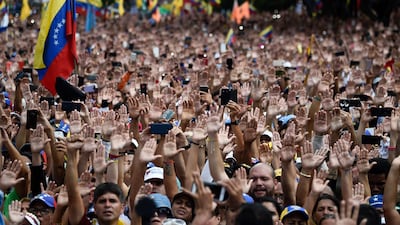Earlier this month, a bomb attack in Colombia by the radical left-wing National Liberation Army (ELN) killed 21 police cadets. Peace talks in Cuba between Bogota and the ELN were called off. Poor relations with Venezuela, which has long harboured the group, soured further.
As the dust settled, it exposed fault lines in Latin American politics, where staunch socialist regimes in Cuba, Venezuela and Nicaragua face growing opposition from neighbouring right-wing governments, including those of Brazil and Colombia. In Venezuela, where a constitutional crisis is threatening President Nicolas Maduro’s ruinous tenure, this trend is evident.
And following the involvement of non-regional powers, including the US, UK and Canada on one side, and Russia, Iran and China on the other, the crisis in Caracas is beginning to look like a Cold War battlefront.
Opposition leader Juan Guaido of the Popular Will party has drawn the support of more than 20 countries since he declared himself interim president last week, accusing Mr Maduro of stealing his 2018 re-election, and pledging a fresh vote. Venezuela has imploded under Mr Maduro’s misrule. Hyperinflation and shortages of food and medicine have made millions flee to neighbouring countries. Weakened, unpopular leaders rely on control over the judiciary and military. For now, Mr Maduro has both. Accordingly, US national security adviser John Bolton and Mr Guaido have urged these institutions to abandon him.
However, the manner in which world powers have swooped on Venezuela raises questions. The US, the first to recognise Mr Guaido’s leadership, has refused to take military intervention off the table, conjuring memories of the 1970s and 80s, when CIA-led assassinations and regime change the norm were in Latin America.
Meanwhile, Russia has accused the US of plotting a coup. Alongside Iran, China and Turkey, Moscow has rallied to buttress Mr Maduro, even sending private military contractors to guard him. Although fighting has not broken out, the use of Venezuela as a proxy in a wider geopolitical game is grimly familiar. Such disputes were a fixture of the Cold War and can have lasting implications in a fractured world.
The implications for Opec – currently chaired by Caracas – will draw attention in this region. In the late 1990s, Venezuela pumped more than three million barrels per day. Now, that figure is 1.2m and US sanctions on Venezuela’s state-owned oil firm, introduced on Monday, could reduce output further. While this fall in supply has pushed crude prices up, suggesting a boon for Opec, markets respond poorly to instability. A diplomatic or military confrontation between world powers over Venezuela’s future could be catastrophic.
It is reasonable to both criticise Mr Maduro’s abysmal economic record and to reject a potential military coup in a delicate region. That is why free and fair elections must swiftly be held in Venezuela, whose people desperately need stability and growth. For that to occur, international powers should refrain from settling scores in a nation on the brink.

